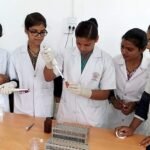What is clinical medicine?
The process of studying and practicing medicine that involves direct observation of patients is known as clinical medicine.
This field of medicine predominantly relies on direct examination of patients for its study and practice. Unlike other fields of basic science that are primarily theoretical, clinical medicine focuses on direct interaction with patients to diagnose and treat diseases and prevent them whenever and wherever possible.
What constitutes clinical medicine?
The practice of clinical medicine can be roughly divided into seven different constituents. They are:
- Primary complaint
- Medical history of previous complaints and/or diseases
- List of activities – be it hobbies or occupational
- Medication history – includes pharmaceutical drugs, home remedies, over-the-counter drugs, and/or alternative remedies used
- Medical history of past diseases, allergies, vaccinations, hospitalizations, surgeries, injuries et al.
- Working social history that includes place of residence, place of birth et al.
- Family history
- Any relevant system inquiry like sudden weight loss/gains, quality of sleep, recurring fevers et al.
What are the necessary pieces of equipment used in the practice of clinical medicine?
Clinical medicine relies heavily on physical examination. Diagnostic medical devices like thermometers, stethoscopes, tongue depressor et al are the staple tools for clinical medicine. Clinical medicine also includes prescribing tests like blood tests, biopsy et al. Treatments are then prescribed in accordance with the relevant data collected, the test results, and the physical examination result. The data collected is then entered into the medical record of the patients for future reference.
click here – 6 Powerful Tips To Master For Success In Fashion Management Course
Why is clinical medicine important in an MD course?
An MD program is an amalgamation of a lot of class lectures, lab sessions, and hands-on experience. While the entire MD curriculum covers everything through its class lectures and lab sessions, clinical medicine is the only opportunity that students get to apply the theoretical knowledge acquired in practical scenarios. Clinical medicine MD program should be an important criterion for every medical aspirant before applying to/ joining a medical school. Not only does clinical medicine provide you with the necessary practical experience required in an MD curriculum, but it also prepares the student for the future where they would have to perform these activities on a regular basis and under considerably more stress and duress.
In a way, clinical medicine can be thought of as a trial period before a student can actually practice medicine. Hence it gives a student invaluable experience before they are out in the real world of medicine.
click here – The Most Important Marketing Metrics That Matter
In conclusion, clinical medicine equips students with clinical skills which include interacting with patients, getting to know them, gaining their trust, precise diagnoses, and figuring out treatment procedures based on their findings. So it can be easily justified that clinical medicine is an important part of the MD curriculum.
To Know Some Great Stuff Do Visit Snorable
To Know Some Great Stuff Do Visit SquareRoott
To Know Some Great Stuff Do Visit StarCasto






